Interview 043 • Apr 18th 2016
- Interview by Lou Noble,
- GL Askew II portraits by Oriana Koren
Links
Foreword
I go into every interview Fresh. Lou – he's the man asking the questions. But me? I'm like you. I'm just a reader. Granted, I have a slight bit more control to the final product, but really I'm just the TPJ interview's number one fan.
GL is a man hitting his stride after years of passionate work. Learning from the best, yearning to be better, searching to find his voice... I don't know about you, but that is definitely something I can relate to. See – I read these interviews for the same reason you're reading this now: We want to be better, we want to see the world through their eyes, and we hope that a bit of whatever they've got going-on rubs off on us in some small way.
- Agustin
This interview has been edited for clarity and content.
Interview
So, you’ve been working in LA for a long time.
Yeah and no, I mean, I kind of started in ’07, I assisted for a long time, I worked at PIX for a long time, I guess I’m one of the few that worked at a rental house and I was super-ambitious, people kinda knew, “They’re here, but they’re thinking light years ahead.” So anyhow, any photographer that would come in, I would be like, “You need help? You need help? You need help?” And it got to the point where I was on set a lot more than I was at the rental house and like they were kinda like “maybe you should do your own thing.”
Hahahhahahahaha!
So, I kinda got let go, which was a blessing in disguise, but I assisted, I was kinda like Whore of LA for like…a long time, just working for everybody, from like fashion guys to still life guys to celebrity guys.
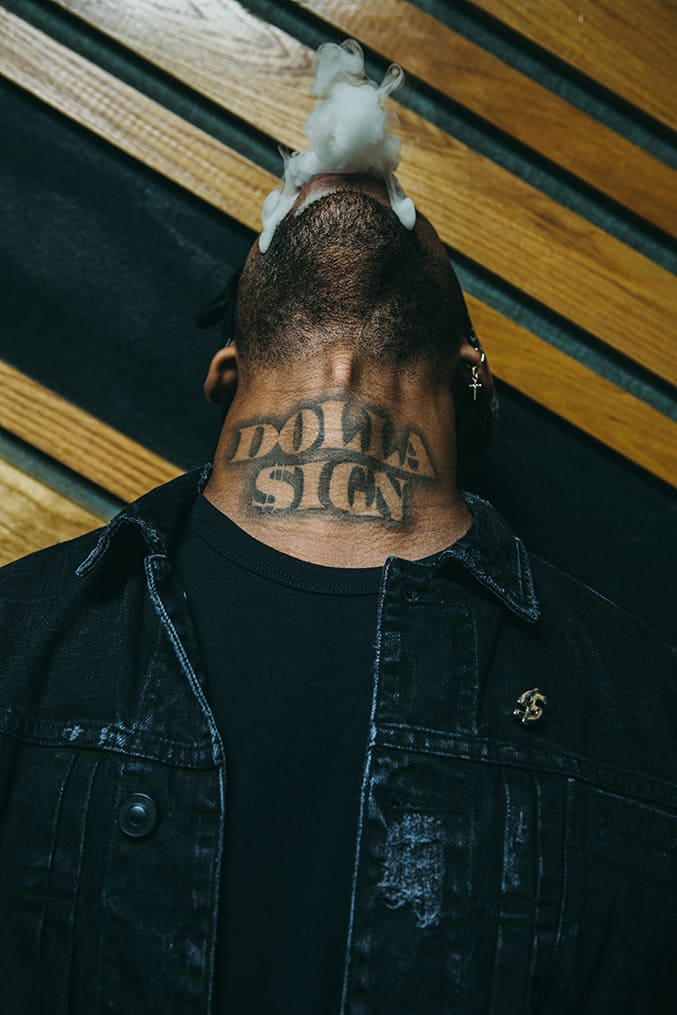

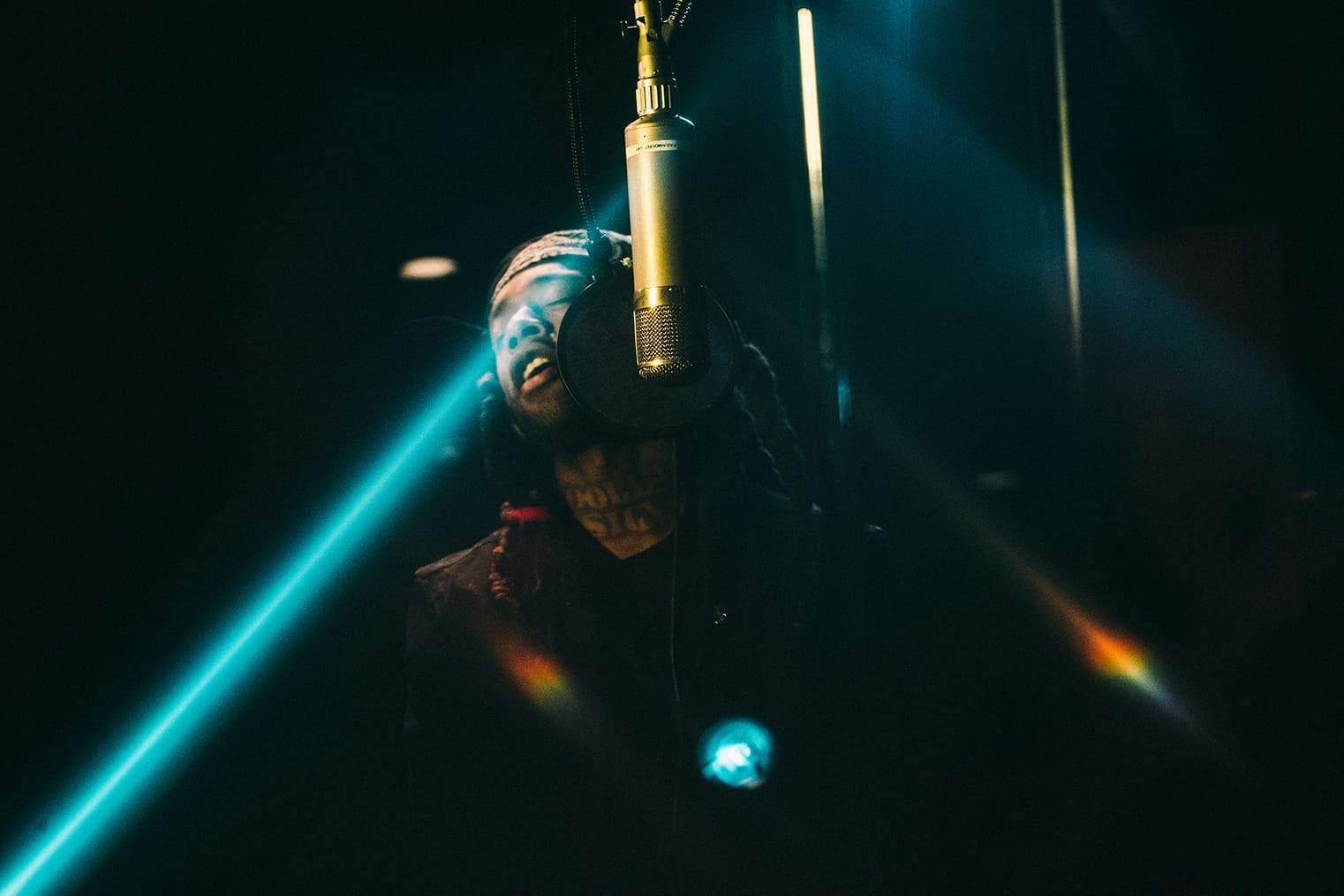
Ty Dolla Sign – Gari Askew
Did you enjoy that?
Yeah! You gotta understand, I’m from Atlanta, I almost joined the air force…
Oh wow.
And I had a chance meeting with Jonathan Mannion, you familiar with him?
Nope.
He was like, the quintessential hip hop photographer in the early 2000s, everything from The Blueprint to DMX covers. He was shooting the Dungeon Family, I was staying with my great grandma at the time, and I went to a liquor store to play the numbers, and he was there shooting The Dungeon Family, and I had always been into photography, and then I saw this whole team, the only photography I knew was like, Walmart or Sears, but I knew I liked it. And I found out, he was staying at the Four Seasons, it was ridiculous, this was back when people bought CDs, and I was like, “This is what I wanna do, the Air Force can wait.”
How old were you?
Like, 19. And so, yeah, that just kind of led to me moving to LA, for a long time I worked in TV production, but I ended up meeting a couple photographers.
Production Assisting?
PA-ing, kind of going the Assistant Director route, and then, yeah, I was assisting, so for me, it was like, “I get paid to hang out on set, this is the greatest shit of all time.”
Hahahaha!
It took awhile for me to get over it, and I don’t think, I just realized you could get stuck, because I’m from, my family is mostly blue collar, so it’s like the kind of mind set where if you just work hard, people will kinda promote you.
Not in Hollywood!
In entertainment it’s not there, you have to go get it, you know? And so, that said, I kinda, I was just really proactive in shooting, and so anyway, long story short…
Oh no, we’ll take the long story!
Oh, well! I was shooting, doing some amateur, not even amateur, I was just really into boxing, I was kinda thinking about doing pro-am, I was shooting…
Shooting it, or fighting?
Kinda like fighting. I was hanging out at Wildcard (boxing gym) every day…
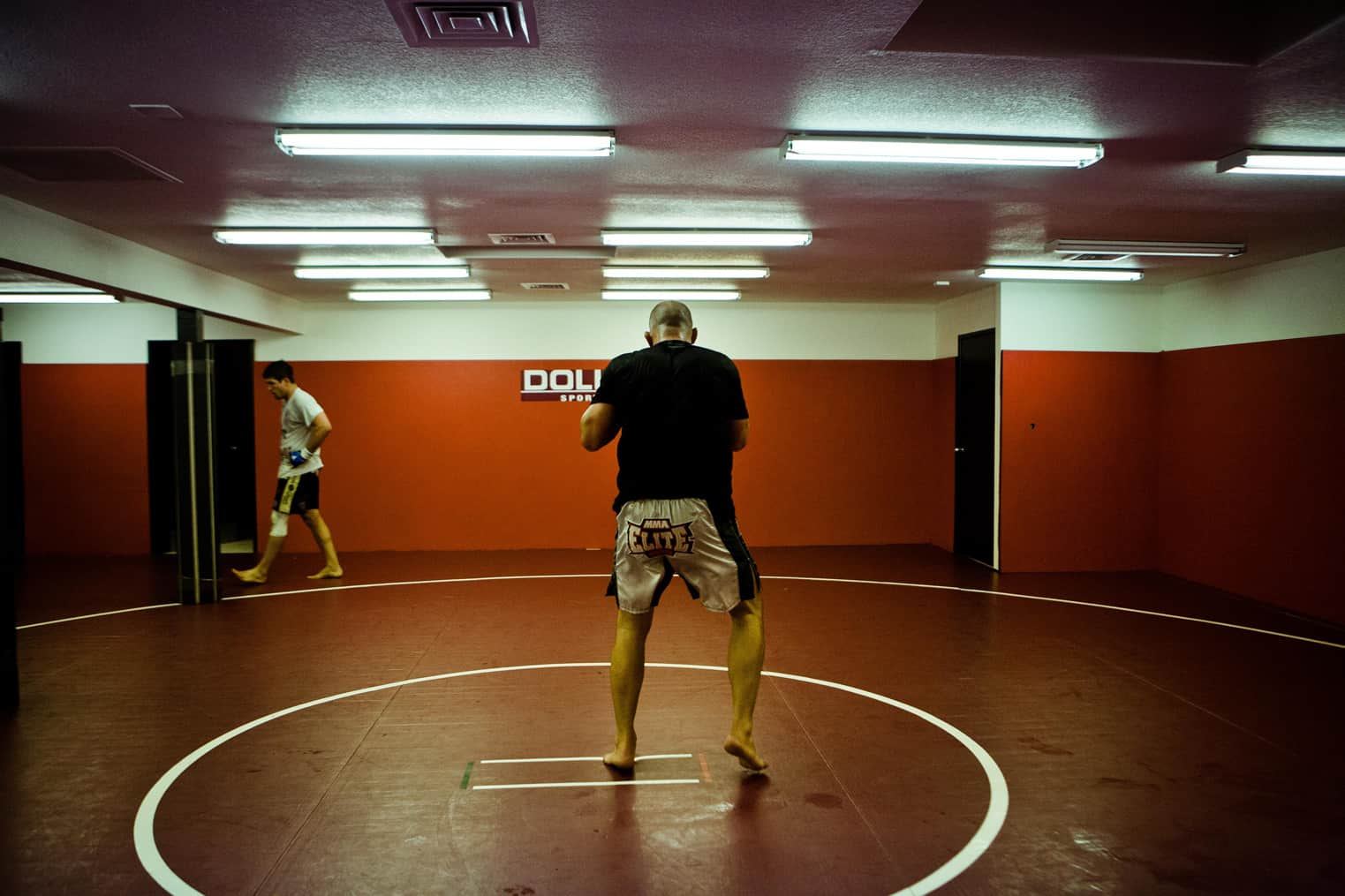
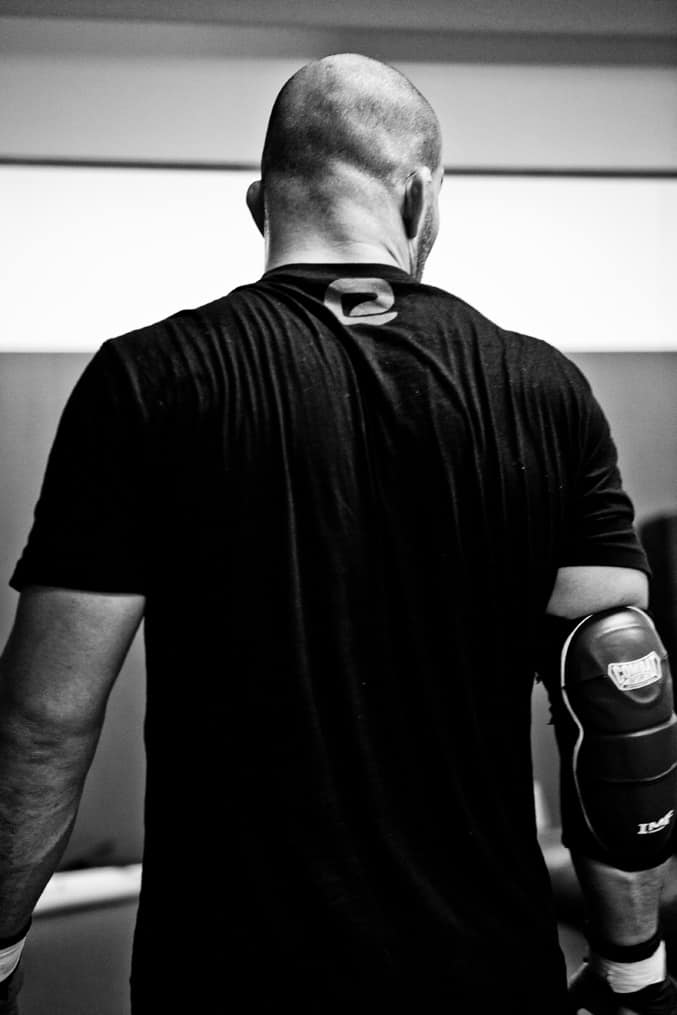

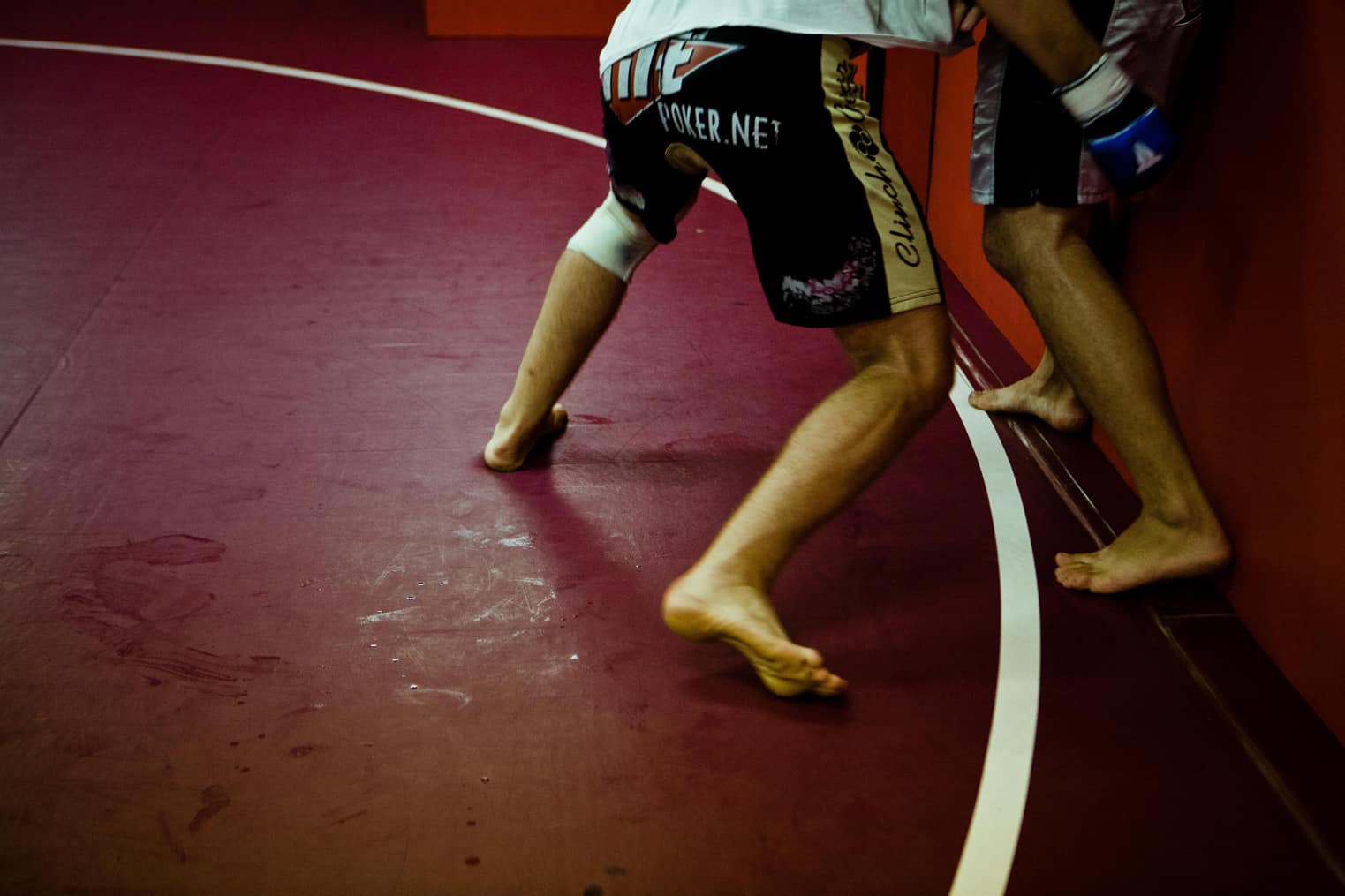
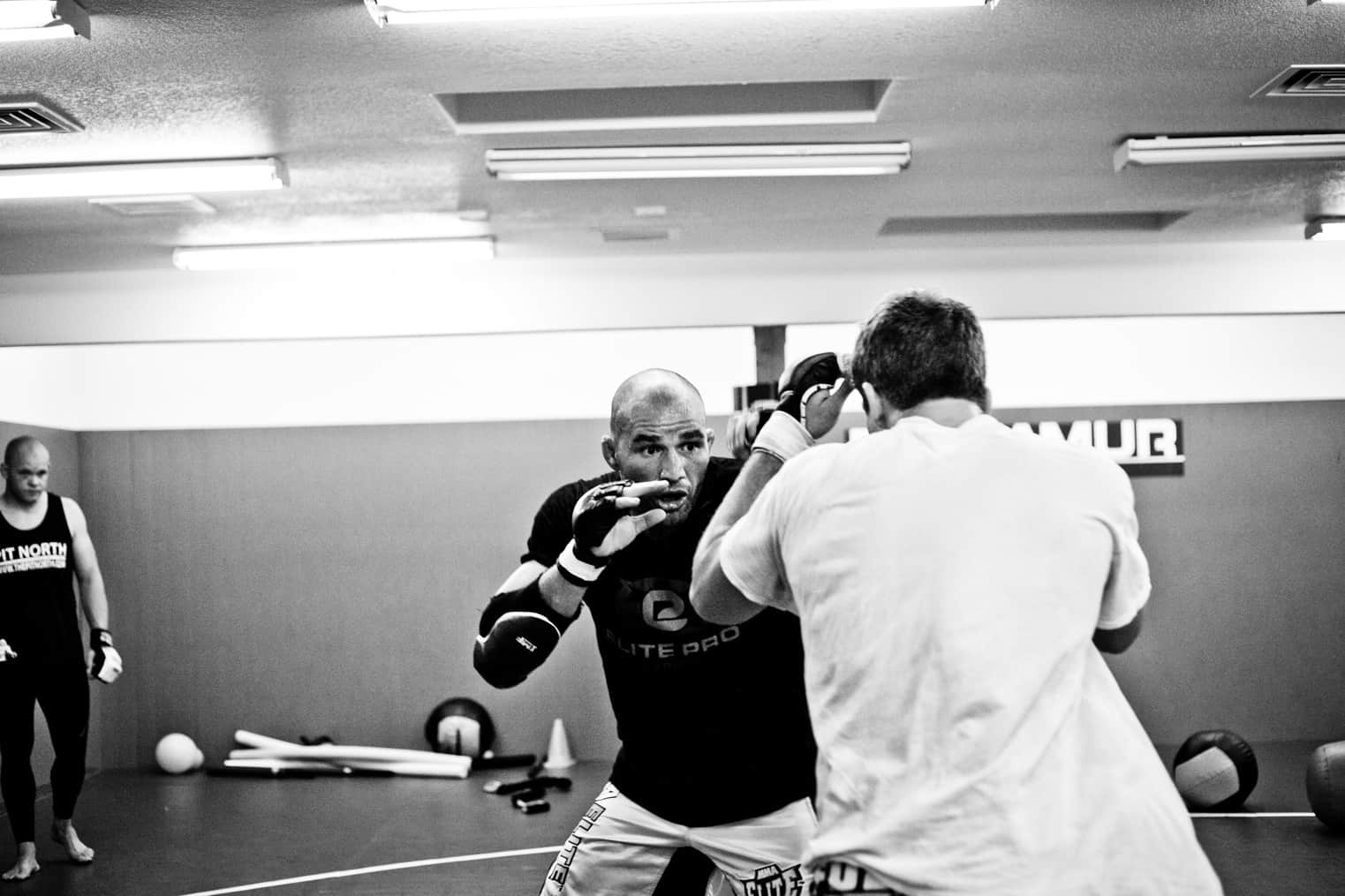
Glover Teixeira - Gari Askew
Oh wow!
And this one photographer I worked for, Roger Erickson, another big early 2000s guy, used to shoot for Vibe and Complex, I was so green and hungry, “how’d you get so good, how did you do this and that,” and he was just “I just shoot what I love, I love music, and that just kinda led to forays into other fields, like fashion and celebrity stuff.” And he said, “Don’t you like to box, why don’t you just shoot it?” So I did this whole community project on fighters at the gym. And then, I kinda saw early on that like music is very accessible, maybe you can’t get into, like, Hollywood Bowl right away, but you can go to whatever club and take your camera and shoot a bunch of photos, so anyhow, I shot around different venues, and eventually, like, kinda found my way into John Mayer’s camp, and did some stuff with him, and then, I’ve been working with him ever since, off and on. But, that was kind of the start, and I thought, “Oh, I’ve made it! I’m there,” but not really knowing the business of photography, you have to promote yourself, I just figured, “shot John Mayer, people will find me!” And so then I had to go back to bartending…
Hahaha!
And doing, because, you know, I didn’t want to go back to a rental house, it was like, when you get a taste of the industry, this is like ’07, ’08, some people are still buying CDs, it was still lucrative, but it was like, enough where I was like, “Wow, this is more than I ever made assisting!”
But, I bartended for, like, a year, two years, and then slowly started making my way back to shooting on my own.
And you were shooting while you were bartending?
Yeah, always, never putting down the camera, I honestly was like, at the time, you know, as you’ve probably talked to a number of artists, it’s like, there are times when this industry is super-tough, and some people opt out, but me, what else do I do? I don’t, know anything else that I’m that passionate about, since before I even knew what it was, I knew it’s what I wanted to be around, before I met Mannion, I didn’t know there were, like, assistants, and publicists, and all this other stuff, I just thought it was, like, you know, I would look at, like, I remember, one of the big things that really got me into photography, I think, my mom was dating a guy at the time, after my parents split up, he used to get GQ subscriptions, and I would, like, I just remember tearing through, like, just seeing names like Willy Camden or, like, Antoine Verglas, all these guys in the late 90s who were like, I’d think, “oh my god, that looks like the sexiest life!” But I didn’t think about all of that other shit, I was just like, “Michel Comte was out with Heidi Klum, just out on the beach.”
Just the two of ‘em!
Yeah! So basically, yeah, always shooting, and then eventually, just got to the point, with the bartending thing, where it started getting in the way of my profession, I was started to get hired for jobs and I’d get in trouble for getting shifts covered and I’m like, “What am I doing? This isn’t what I want to do.”
Did that first Mayer job help? In terms of your career. Because it sounds like you did it, and then it dropped?
It helped only in the sense that, like, you saw that, like, this thing that maybe I’ve always aspired to do, there’s a large entity, like a person or a label, a person like John Mayer, it was a validation, but in terms of monetarily and career-wise…I didn’t necessarily blow up, I wasn’t in a place where I could take some time off, but maybe it helped me in terms of, like, if I reached out to other artists, because I had that name under my belt, I could…
Street cred.
Yeah, yeah, but in terms of, did it help career-wise, it didn’t, really, because I didn’t know the steps, I didn’t know, like, about email marketing, how to…
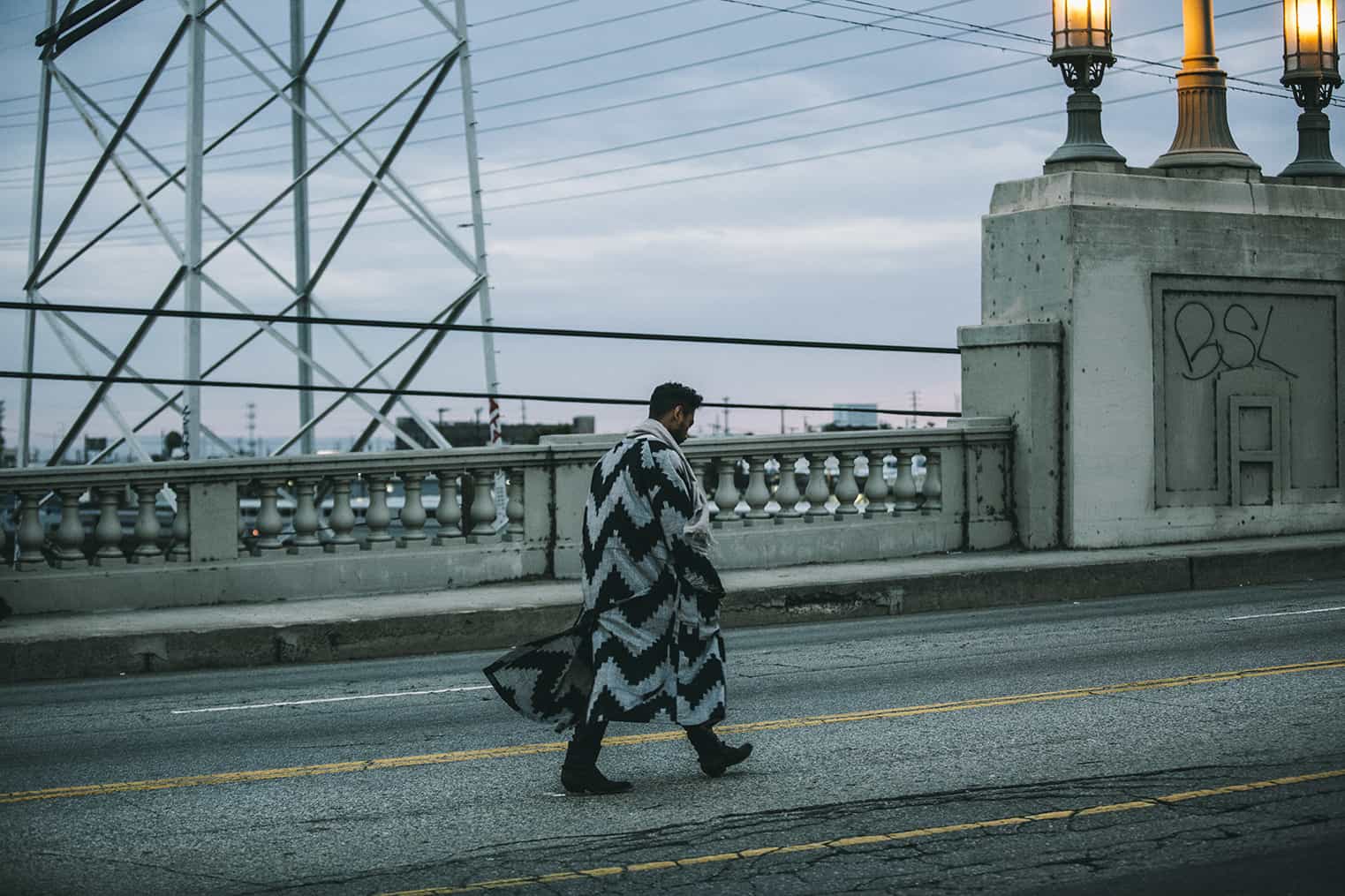
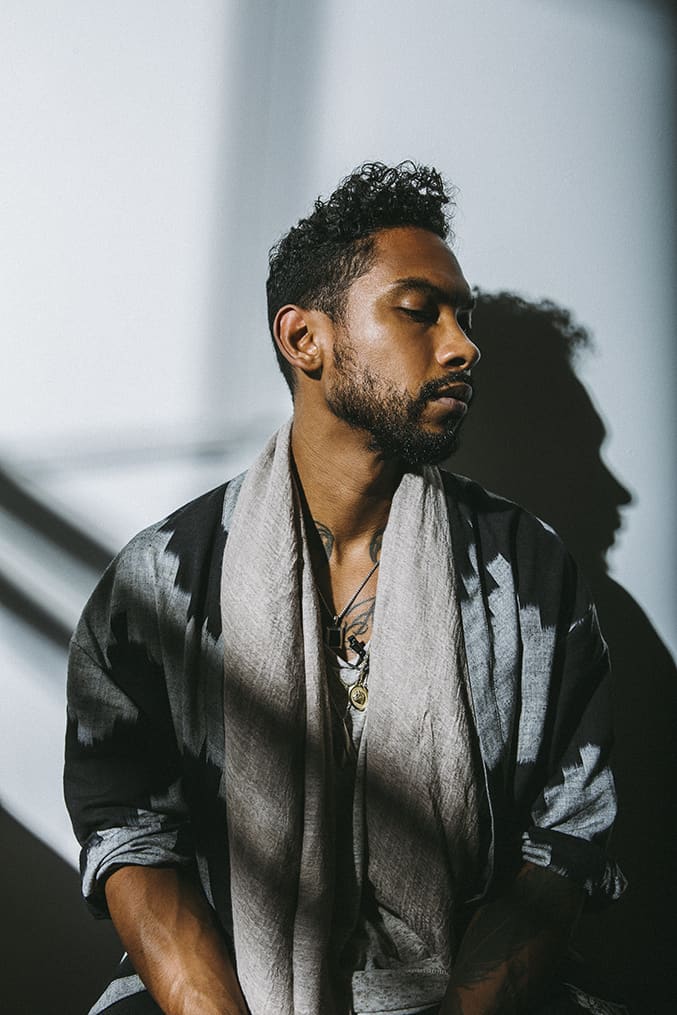

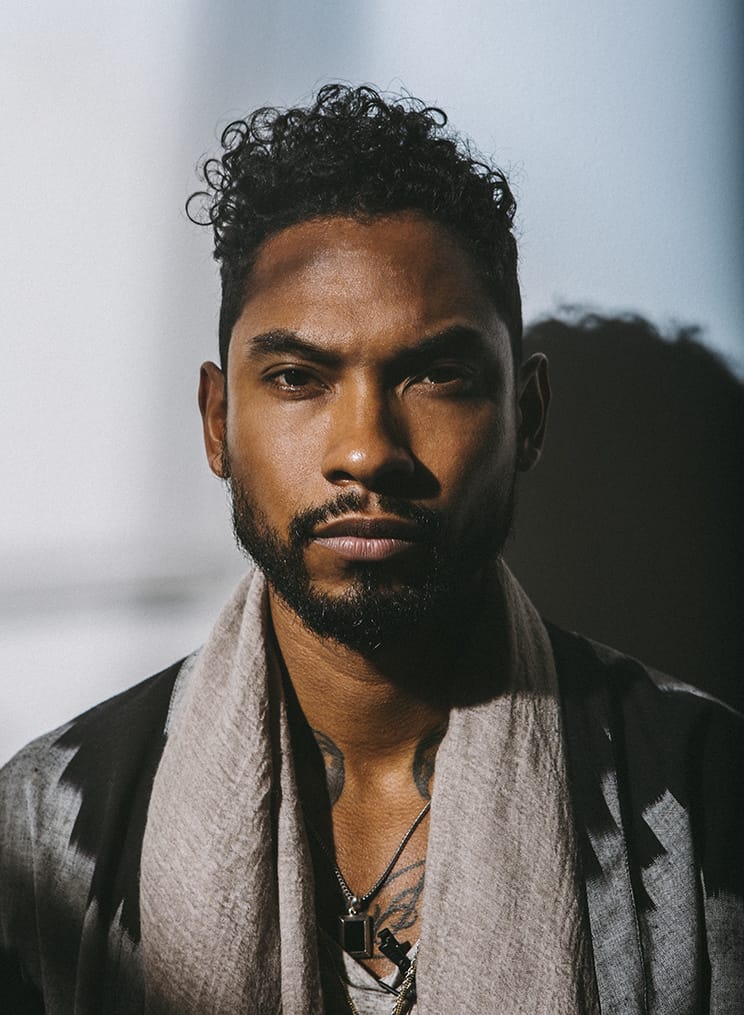

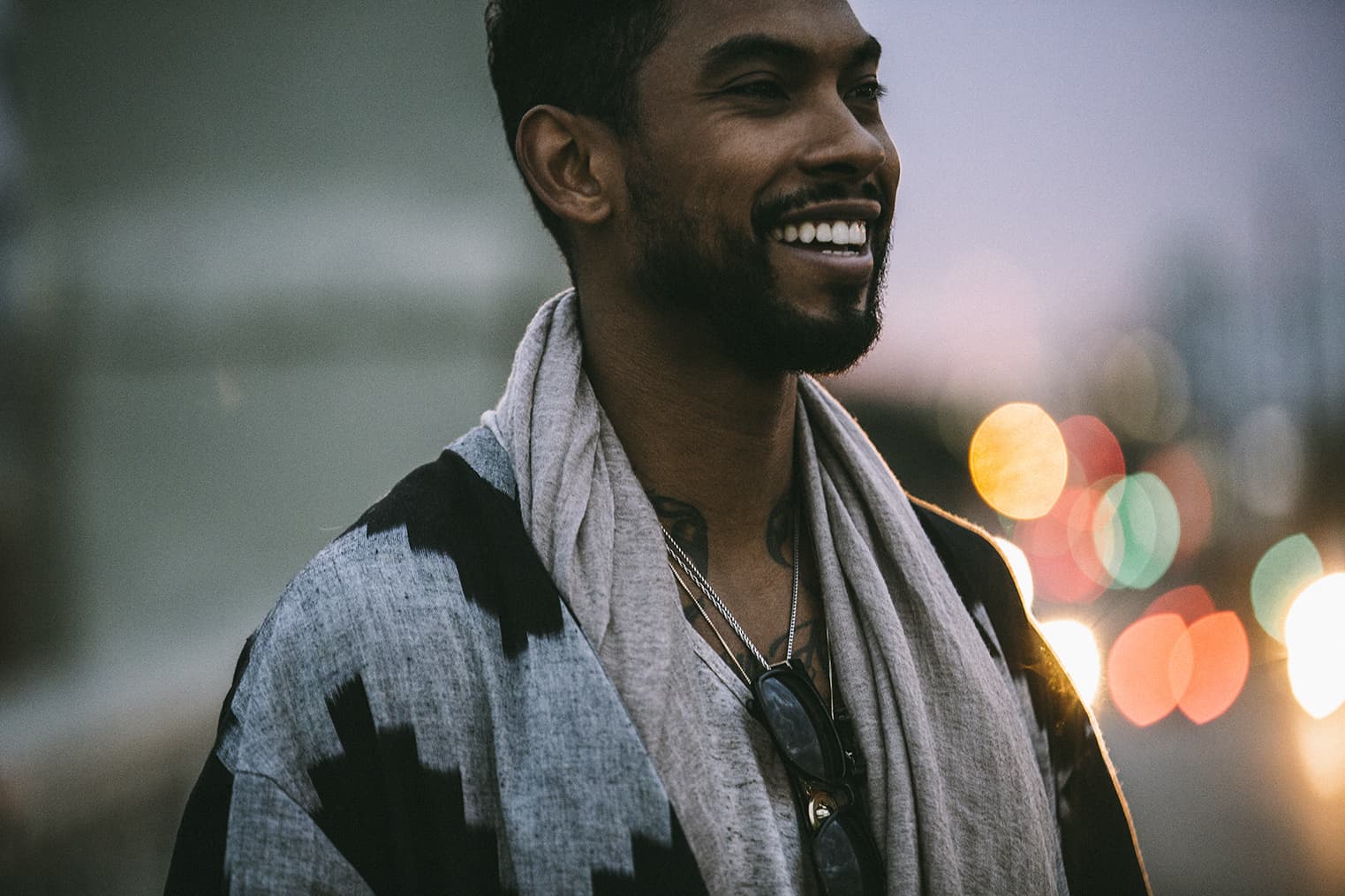
Miguel – Gari Askew
How to use it as fuel.
Yeah, no, I didn’t, yeah, I was sitting, literally, thinking, “Yeah, people will call me!” Not even in a cocky way, just kinda like, “That’s what happens, right?” Now, I’m at the point in my career, not only am I taking some kind of accountability, but sites like yours, like Rob Haggert’s (A Photo Editor), it’s really good because it allows you to have, whether direct or indirect mentorships, because I think a lot of times, as a young artist you just don’t know a lot of the steps of what it takes to being a working photographer/artist, what it entails to run an actual business.
“They’ll just call me!”
Yeah, so anyhow.
It’s that one thing that nobody ever teaches you.
Exactly. And I think, back to my assistant thing, that was kinda, like, the Achilles Heel, it was like, I was blessed in that, I worked for so many different types of photographers, I saw, like, for lack of better words, every way to skin the chicken, but I felt like that kind of one on one, that I know a lot of my peers might have gotten, people that maybe have worked with, like, Art Streiber, Mark Seliger, on a day to day, they got an insight into how to operate a business, and I don’t think, I didn’t get that, because I was never, like, I was kinda…
You were on set, and that was it.
Yeah, and at the time I prided myself on that, because for me it was an opportunity, there was never a lull, you’d hear the chatter in the community, “oh man, it’s really slow, if you know anything, let me know,” and I never had that. Because I felt like I was so diverse.
In what you were able to do as an assistant.
Yeah.
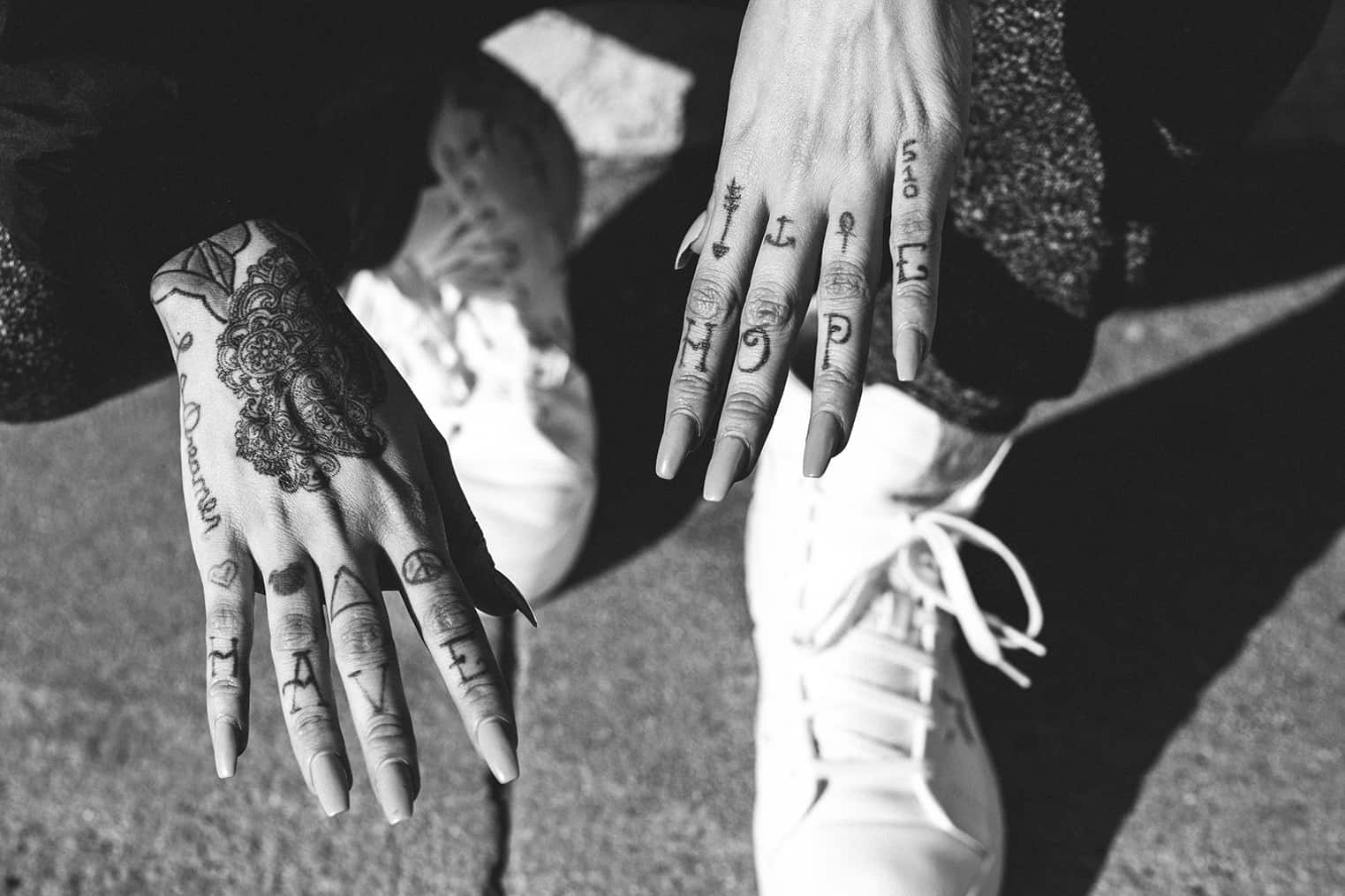
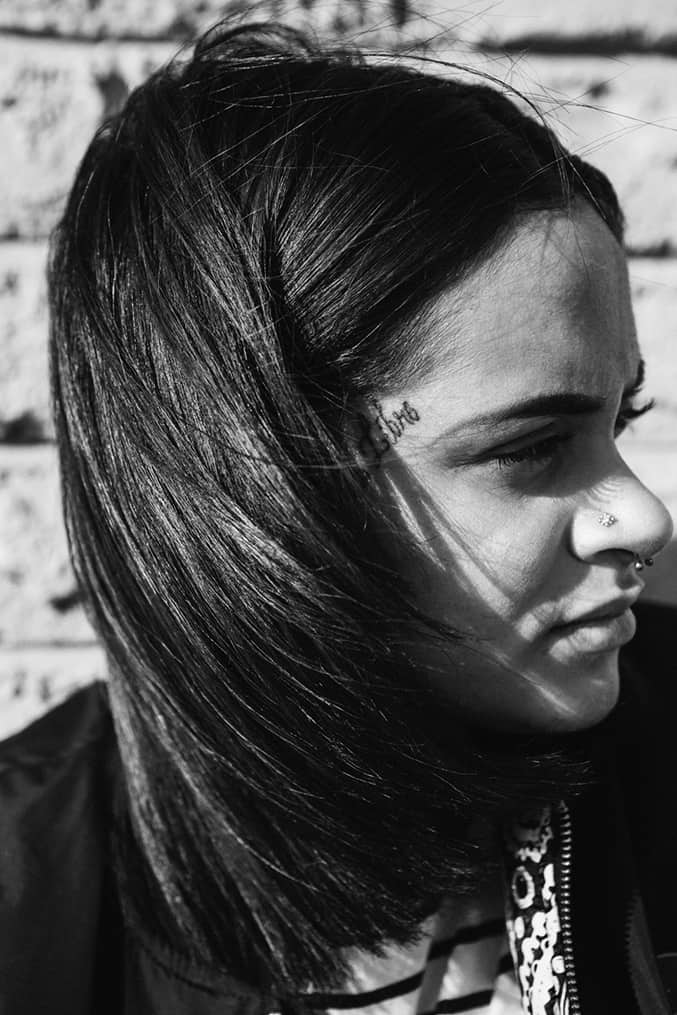

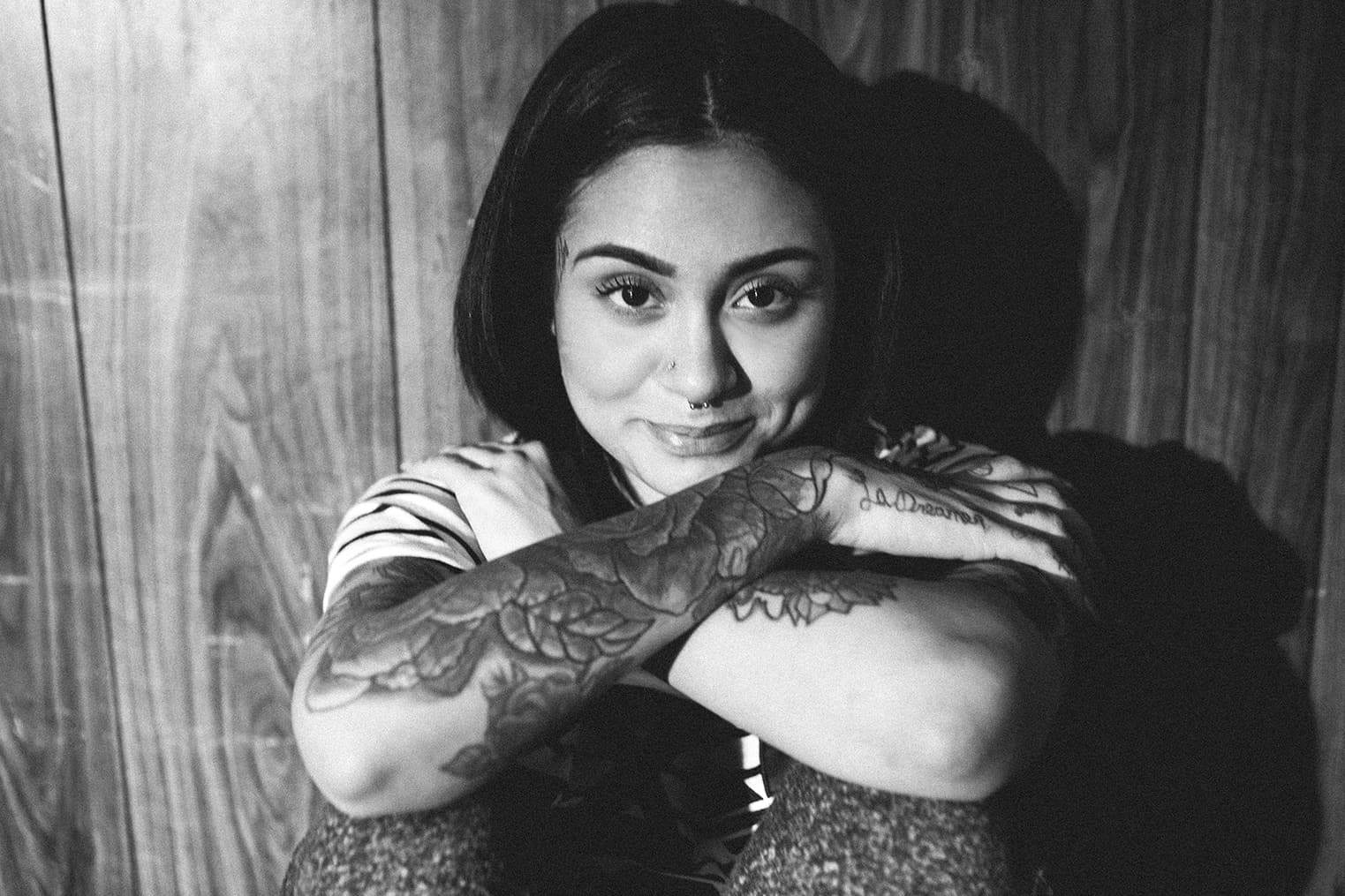
Kehlani – Gari Askew
And it reflects in your style now, because your work is quite versatile.
Yeah, but that’s a blessing and a curse, and it’s also, not even a blessing and a curse, it’s also…I feel like, just within the last year I’ve kind of come into who I am, stylistically, I feel like now is, like, the time to push, whereas before, in, like, the beginning, let’s say that, like, that ’07, ’08, ’09 period, I didn’t know how, and let’s say maybe 2010 to ’11, the whole bartending whatever, working, like, odd jobs, I knew how, but wasn’t, couldn’t really stand behind it, because I felt like, it wasn’t me, it was an interpretation, not even an interpretation, I felt like it was me just rehashing everyone I had worked for.
You were doing a bunch of cover songs.
Yeah! Yeah, I felt like I was the cover band, like when you go to Thailand and you’re like at the resort…
Or a session player!
For a long time I was the session guy.
You’re like Sheryl Crow!
Yeah! Later in life, I found my “If It Makes You Happy”, I’m hoping the next year is my “All I Wanna Do” breakout. So now I feel like I’ve found out who I am, and so it’s just been about retooling, getting the troops together to stand behind that belief.
Was there a tangible moment where you thought, “Oh, this is what I’m after”?
Not a tangible moment, but yeah, I started to, I feel like there was a period of time, you know, without sounding super-New Age-y…
We’re in LA! What better place?
Hahahahha! I feel like as I got to know myself more, and then just being a witness to the machine, the Instagram and Tumblr, it’s like, I’m sure you’ve run into this, all of us can get in that 3-hour…and the cool thing about the blessing and the curse, with that, is that, for all the inundated images, you can kind of curate, you see what you like, right away, and so I started to see this rhythm of, “this is what I feel,” and it could be anything from, like, photographer blogs to just, like, thot Instagram blogs, ignorant ratchet shit, you’re like, “okay, this is what’s speaking to me, now it’s up to me to regurgitate that into what I think.”
How would you define your style now?
Oh man.
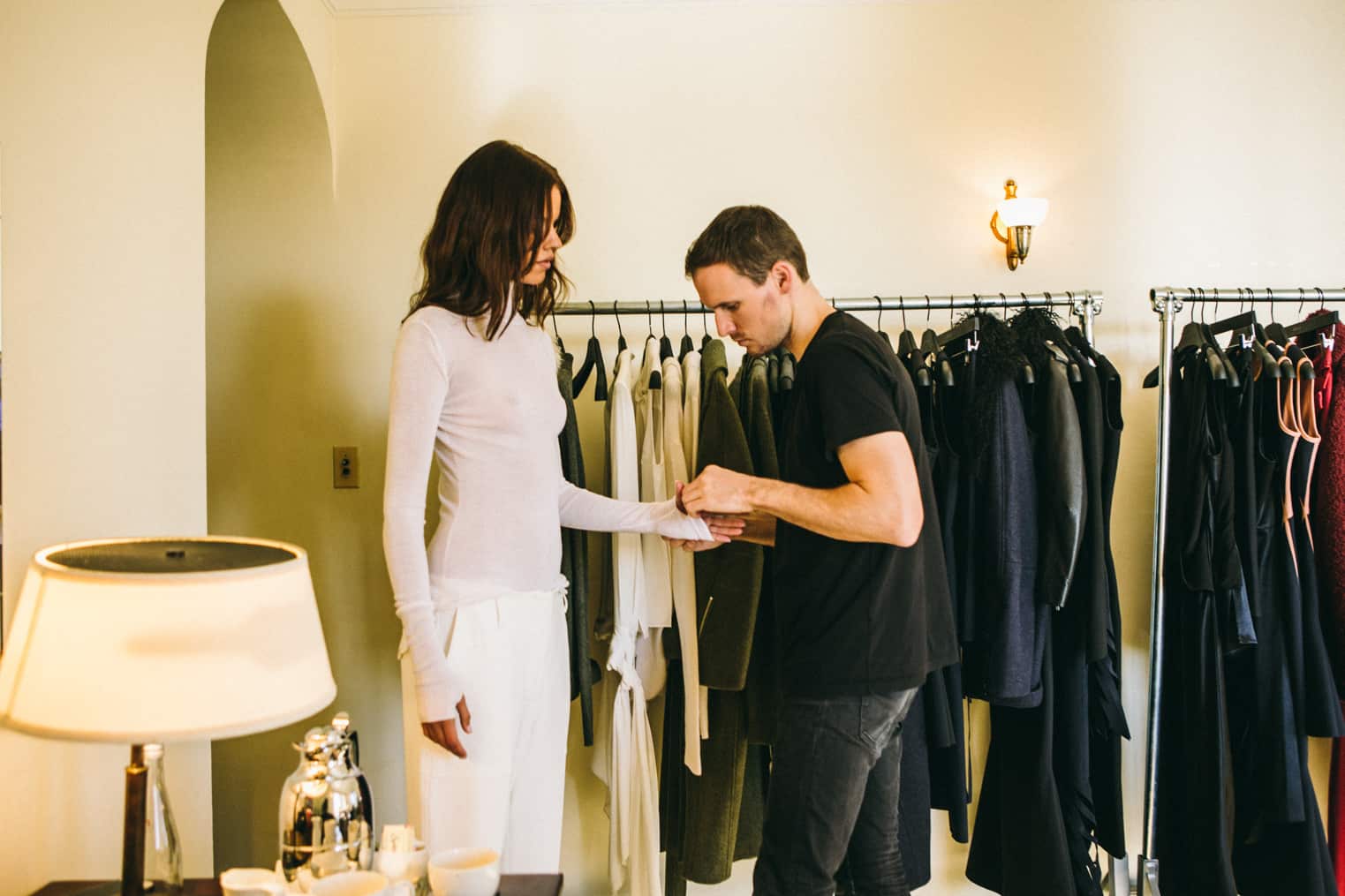
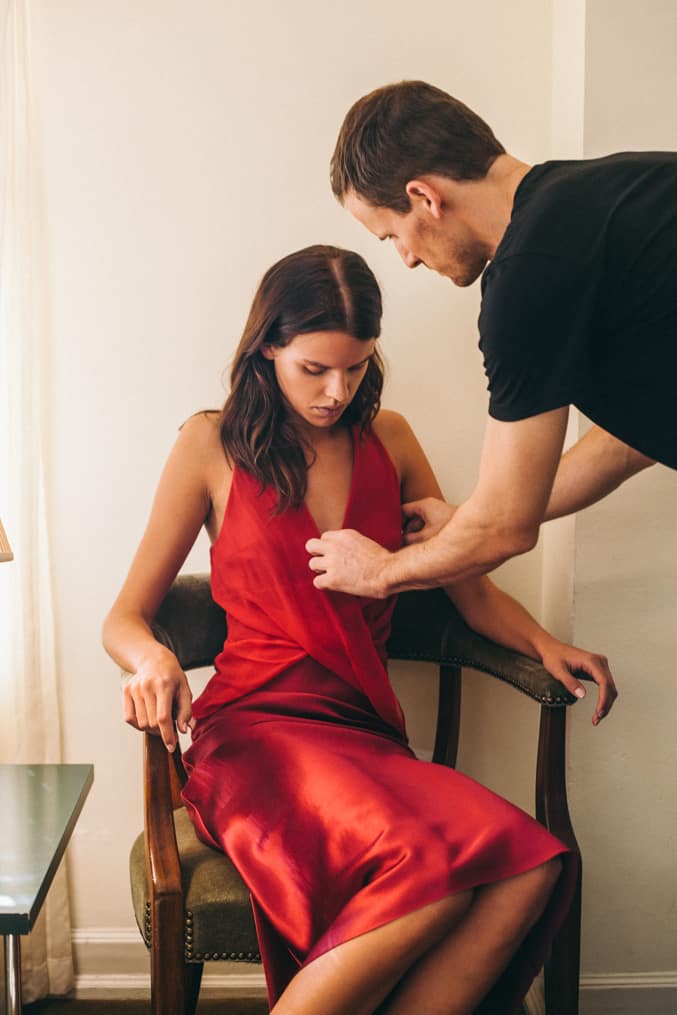

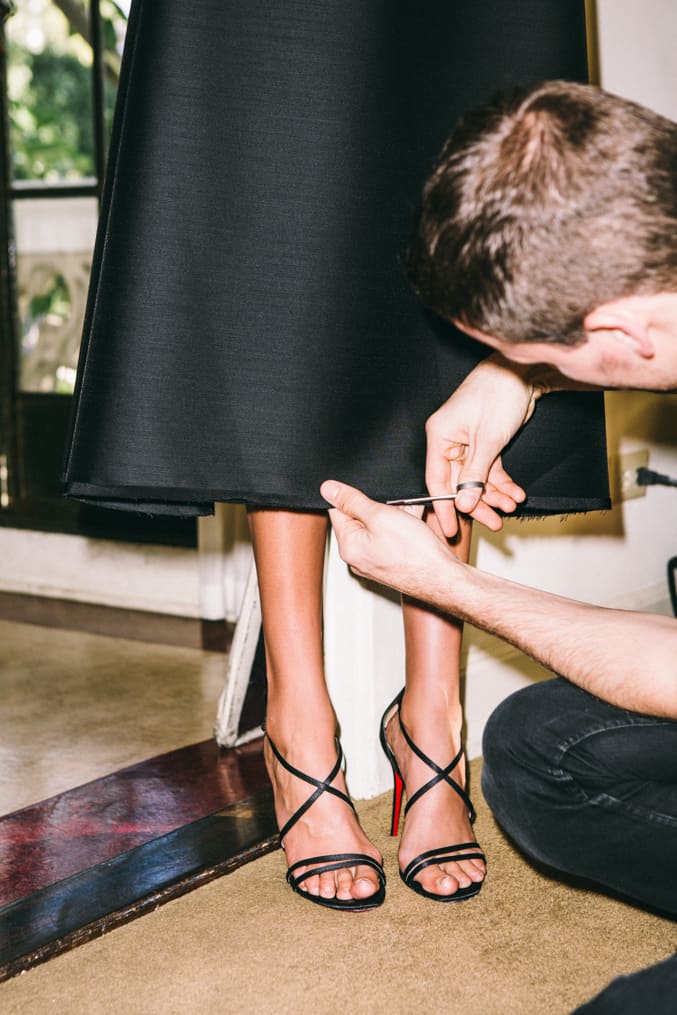

Dion Lee – Gari Askew
That’s right!
Hahaha, I don’t think I can put it into a catch phrase, but, it’s very indicative of who I am, so I guess…hood chic.
So you can do it!
Yeah! Hahahahaha, almost Barney’s meets Big Lots. Hahahhahaha. Because that’s the world I came from, so I definitely grew up with some very salt of the earth people, and that’s what I feel like my work has to reflect, aspirations, but at the same time, a very true sensibility. More than anything, one of the things that happened, it’s interesting because, even amongst people that I root for, or really look for, it wasn’t until I started to see the whole by-product of the whole Street Etiquette movement, which I felt like they had this platform, it was this eccentric, eclectic New York circle, I started to see their work and I felt this anxiety you get when another artist is kind of doing something that’s kind of closer to work you…and before I saw that, I didn’t see an updated version of what my people and my demographic could represent.
Anyhow, I would see their work and, you know, when you see people’s work, you tend to see most people’s work is strongly influenced by their upbringing and their background, and none of that…I felt like, the saying is art can kind of be like commerce, you study the market and you see where there’s a need, and I felt like none of those guys were speaking to how I grew up.
So I would look at all that work and think, “Yeah, there’s a place for me. I don’t see them saying what I want to say, but I love the richness, the familiar aesthetic.” Because I would look at a lot of guy, peers I came up with, friends I came up with, people I worked for, I would look at everyone from Ryan Schude to Ryan McGinley and I would be like, “I don’t have crazy hipster friends that are going to run around naked in the desert,” but I do have these people I know that won’t go outside that whole freeway block…
That won’t go North of the 10 Freeway…
Yeah! And so, I found other inspiration for how I wanted to speak, other artists, like Henry Taylor. He went to Cal Arts, but he’s from Oxnard, super-authentic work, it almost reminds you of a new age twist on Jacob Lawrence, very rich but very At. Ives malt liquor…but I really feel like, in LA, there’s no one really putting it down, or at least saying the things that I’d like to say or see as an artist. Particularly an artist of color.
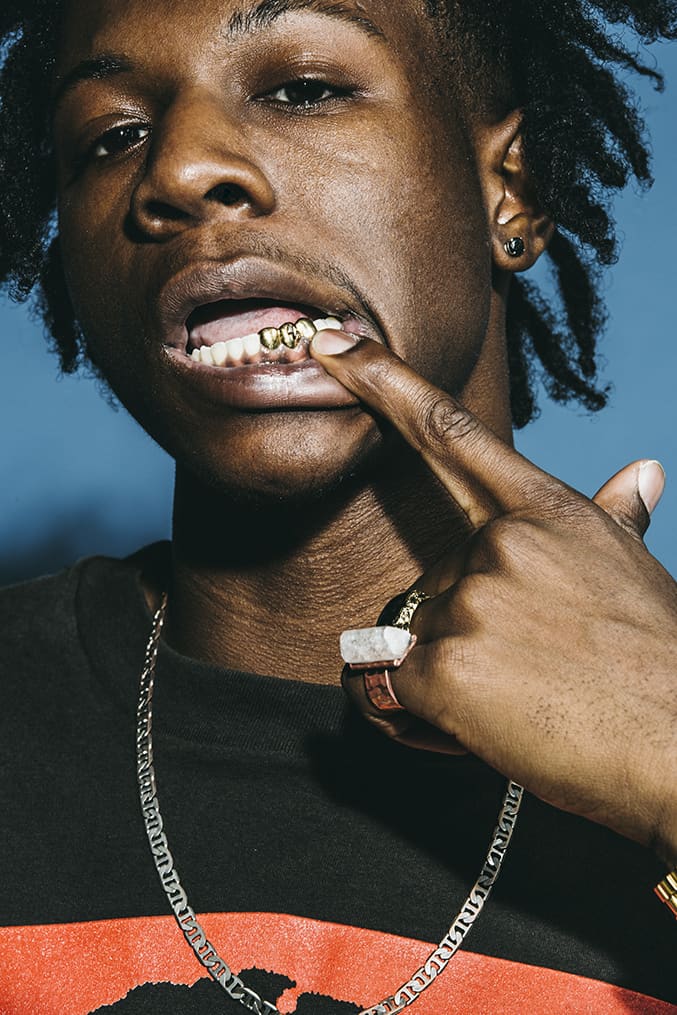

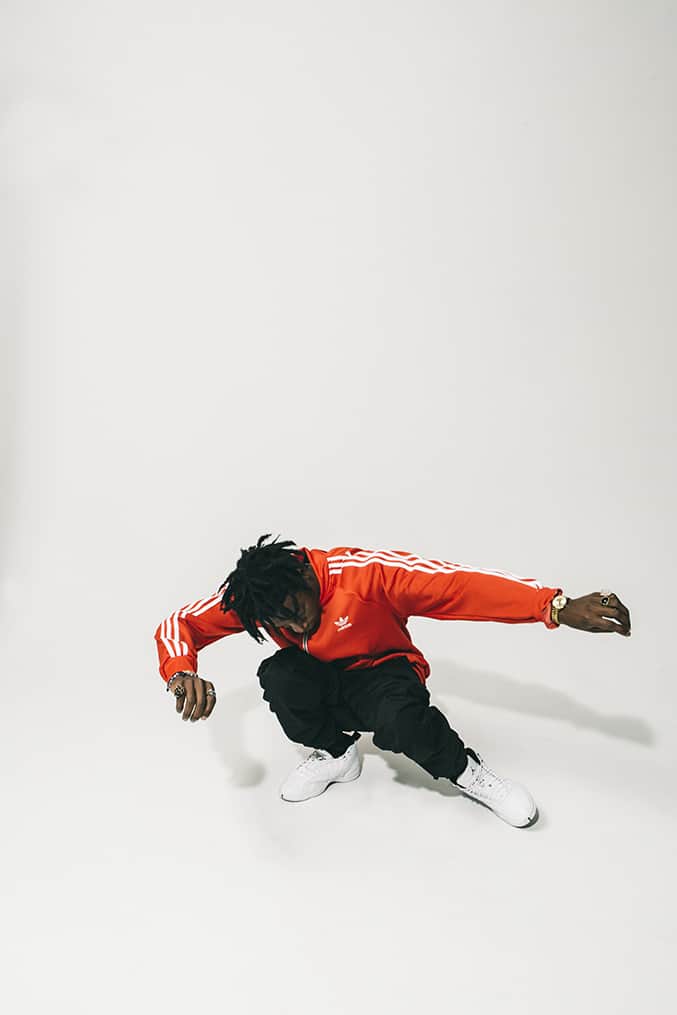

Joey Badass – Gari Askew
And seeing that in New York, you’ve got Andre Wagner, Rog & Bee Walker, Emmanuel Afolabi, King Texas, that whole Street Etiquette crew.
And the beautiful thing in that, I will say, what it did for me, it woke me up, I was like, “Man, these are some people that look like me, and they’re doing it, it looks tight, it doesn’t look sloppy.” And I say it woke me up because I came from this transitional period, I wasn’t one of those hardcore film guys, the guys that I would work for, that had these stories of working in the darkroom for hours on end to put their book together. And I wasn’t from this whole new generation that could have a whole career off Instagram, I was at the crossroads, and some of us pick it up way before others, just right away, I wasn’t so gung-ho to post photos on Flickr because I was like, “aaaah…”
Was it because you didn’t know what you wanted to say?
Yeah, I was just happy to get in, I was still that kid, happy to be there, so coming from that old school, where these guys felt that people like Gordon Parks and Roy DeCarava paved the way for them, and they felt the need to be “safe”.
I remember working for a lot of black photographers, and we’d be shooting something like All State, but it’d be…
Black All State.
Yeaaaah.
And I don’t know any of those guys…maybe because they were always shooting the I’m Lovin’ It ads, their names never became well known enough outside of that realm, they were ghettoized.
Yeah. But the thing about the Street Etiquette crew, all of a sudden the internet, which gives us a platform…because you must admit, for me, I met with a mentor of mine the other day, and we were like, “you gotta think about your five year plan” or whatever, you know, things mentors say, but I know for me, ultimately, I want to be maybe a creative or art director of some sort, so for me, in preparing myself for that, at times I’ll just go on the internet and nerd out on vintage magazines and nerd out on the art direction. Because back then I felt like more editors and art directors weren’t so afraid of risk.
I feel like, in a lot of ways, the internet has given me permission to do what I want to do, where before I felt like I had to work within these parameters. You think about this industry now, when I first aspired to be a photographer, it was almost equivalent to a guy that makes furniture.
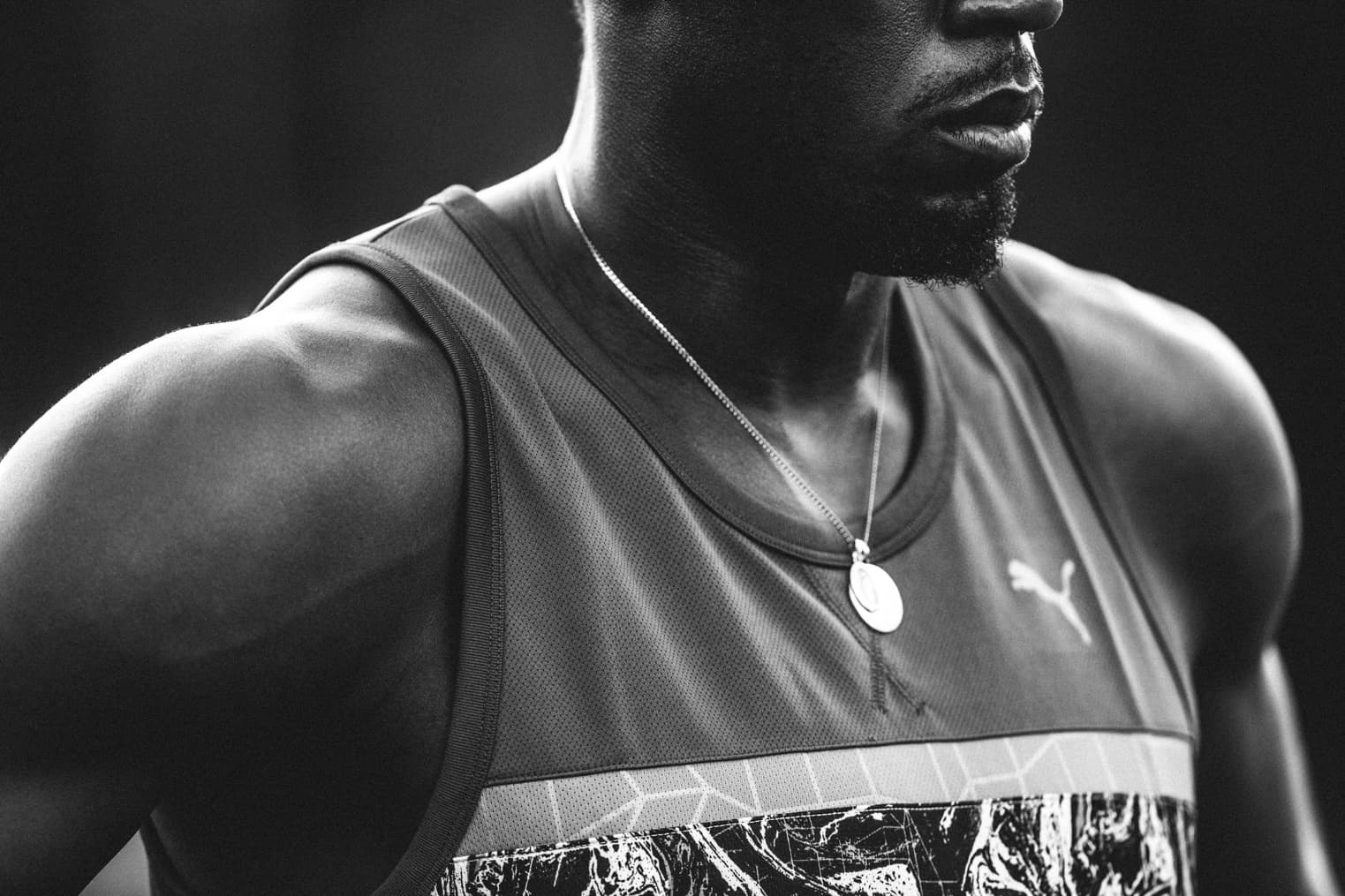
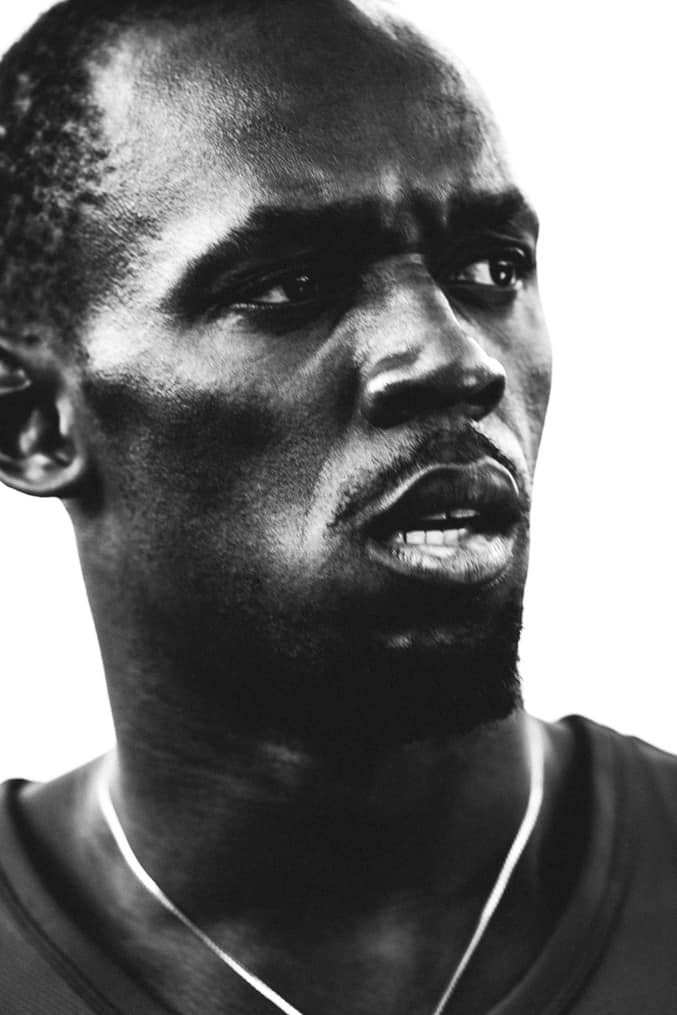

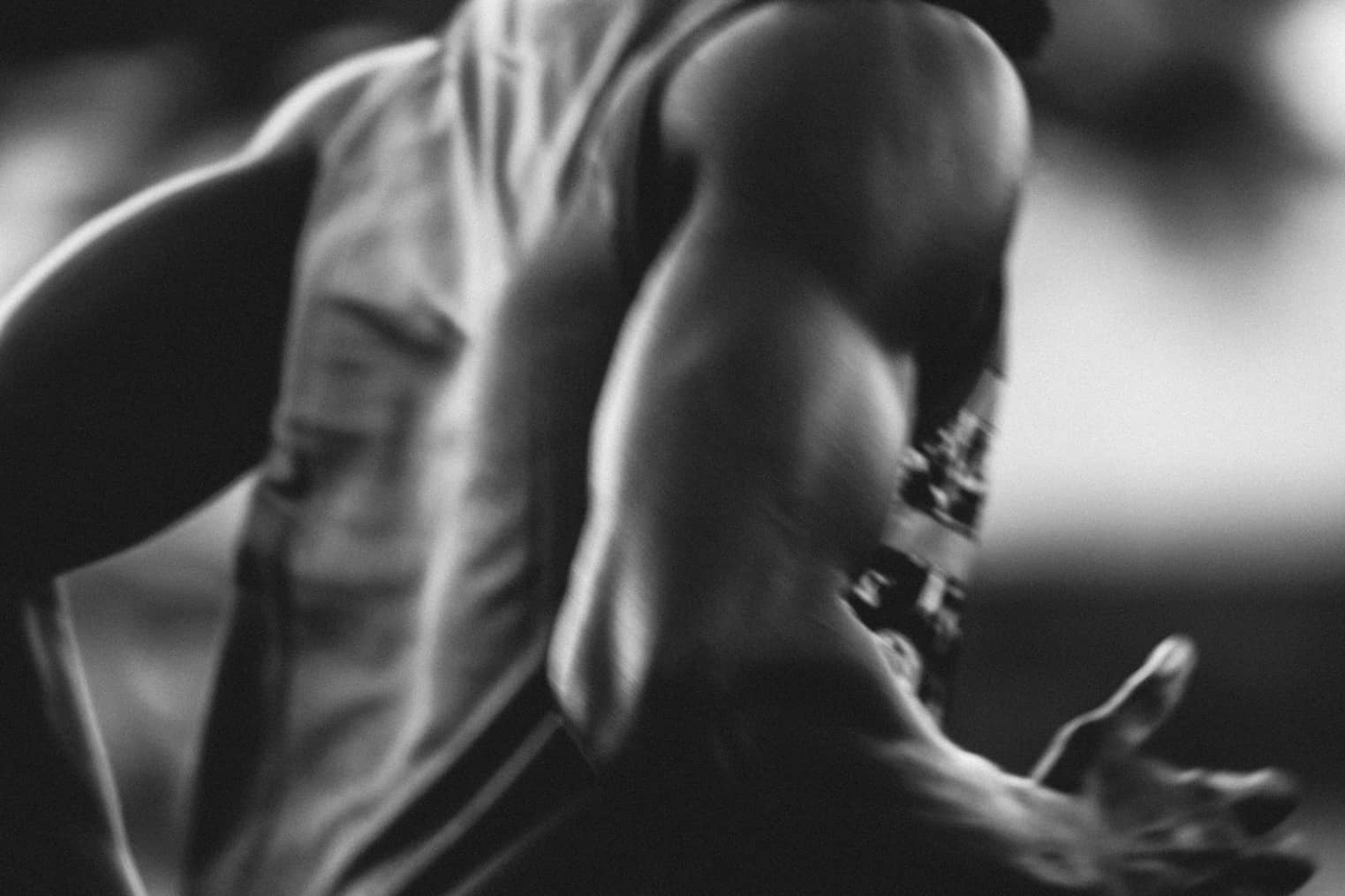
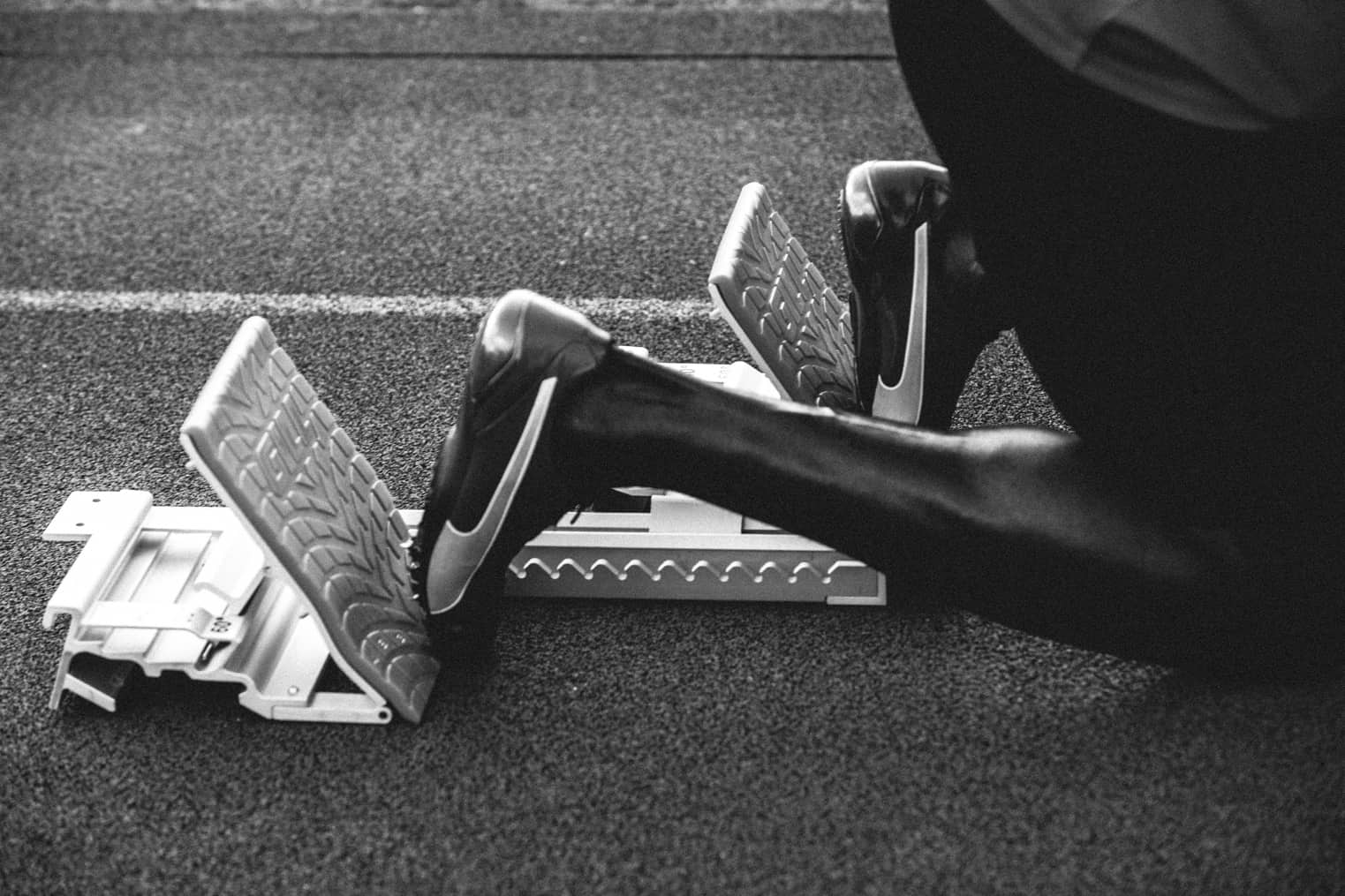
Usain Bolt – Gari Askew
A craft.
Yeah, a craft. At the onset my intent was to be the guy that makes the most amazing furniture there was. And I knew if I dedicated myself that I’d reach that goal. But now with the internet, the blessing to all has been that there’s a lot of furniture and furniture makers, but I think it’s just as important to maintain your artistry. Stay devoted to that task. I think the process takes care of itself. And those whose work speaks to someone or whomever get recognition.
It’s funny, because you’ve worked for Chris Buck, you’ve worked for Martin Schoeller, you’ve worked for people who have very idiosyncratic visual styles. That crafting of a style, that wasn’t something that impressed itself upon you?
I don’t think I thought about it until later…I just wanted to be a director, as if I was directing an episode of That’s So Raven or a Worldstarr video, I just wanted to direct, I didn’t know that maybe I wanted to be John Cassavetes, or maybe I want to be Terence Malik, you realize later that these people are auteurs and at the time I didn’t realize what that meant. I want something where people come to see it because of me, not something like Spy Kids 8.
Which was a great movie, by the way.
Hahahahhaha, and so I realize that now, in the internet age, so much of it is not about compelling photos, it’s just about having a compelling brand, and me trying to manage the two.
So nowadays, where is most of your work coming from?
I’m still doing a lot of music, I’m photo-editing for this website called Yours Truly, and I’m at that crossroads, I’m feeling the need to expand my voice, like Ferguson, or what’s going on down in South Carolina, or event to take it a step further, I feel this need to bear witness to stuff like that, chasing whatever IT band is cool, but at the same time, I have this tool that allows me a lot of access and influence, and I want to use it to really say something. So that’s where I’m at now, trying to figure out a way, because I’m happy with the music stuff, my thing is kinda portrait/documentary/sports/music, but to really take it a step further, it’s funny, I’m reading about Edward Curtis, he’s super-famous for, at the turn of the century, photographing Native Americans, reading stuff like that, I’m getting into different things, mentorships, to see how other artists chose to shape their paths. Because I feel like, for me, as someone who’s self-taught, to see how people go about finding their way, because hopefully in the next six months I can pick stuff that speaks to the current social voice, but my way. Like the recent acceptance of gay marriage, but wouldn’t it be cool to explore that in a place like the Middle East, or we’re coming up on the end of Obama’s tenure, I would love to be this non Associated Press guy, following Clinton or Sanders or Trump around, showing what it would be like…
You want to do some reporting.
YES. And it doesn’t have to be on a grand social scale, it could be something as simple as following Fetti Wap around, or any artist or athlete, but I want to peel back some layers, and put my stamp on it. And I have some of that, but not enough of that. And going forward, every shoot I do is becoming more solidified in my voice. Where people come to me because I’m Me. As opposed to people coming to me, “Oh, we just wanted someone to shoot it,” because I’ve gotten a lot of that. A lot of jobs where I’m thinking, “Oh, anyone could shoot this.”
That, for me, has always been the most important thing for a photographer. Because, like you said, with the internet, with a bit of hustle and a bit of knowhow, you can blow up.
Yeah.
But neither of those things require talent Or good photos.
Yeah! And for a long time I was ashamed of that. Pre-internet, most photographers didn’t become great photographers until their 30s, at which point you’ve accrued some life experiences, you can bring it to bear. And I still grapple with that every day, that I’m just not a social media savant, because I’ve had people…especially when you deal with people who are very Of that culture, who will go, “oh, you don’t have at least 5000 followers? Why would I work with you?” But I am happy about coming into my own, really finding out what it is I stand for, and now it’s just a matter of doing the work.
Another thing that I didn’t know for a long time is how much work it actually entailed.
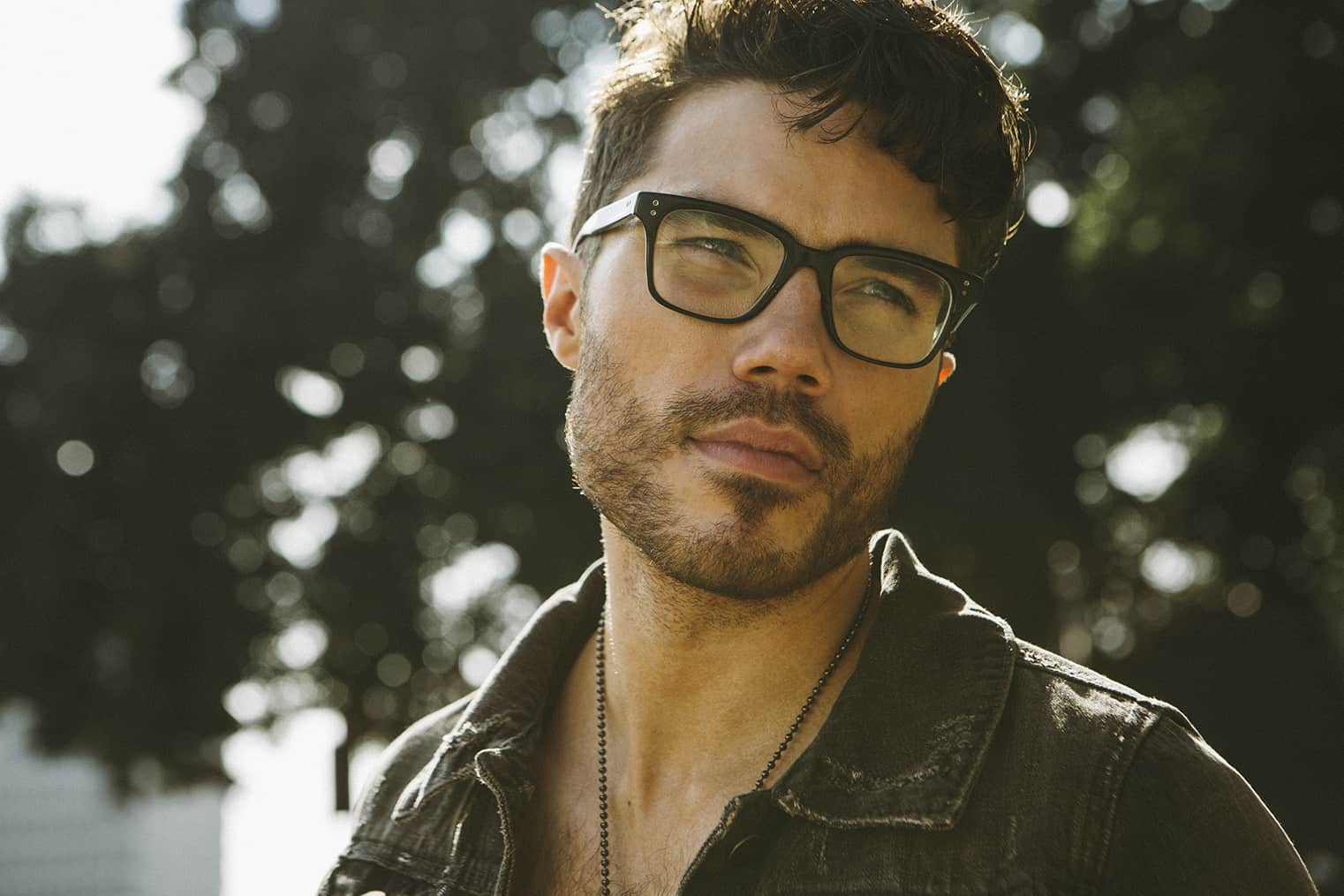
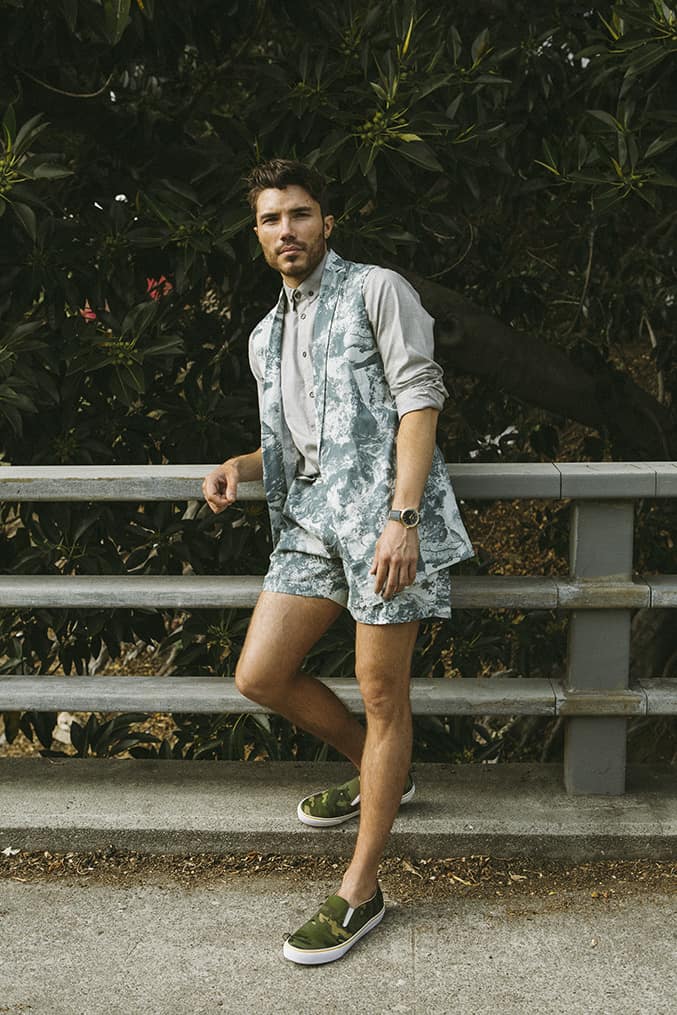

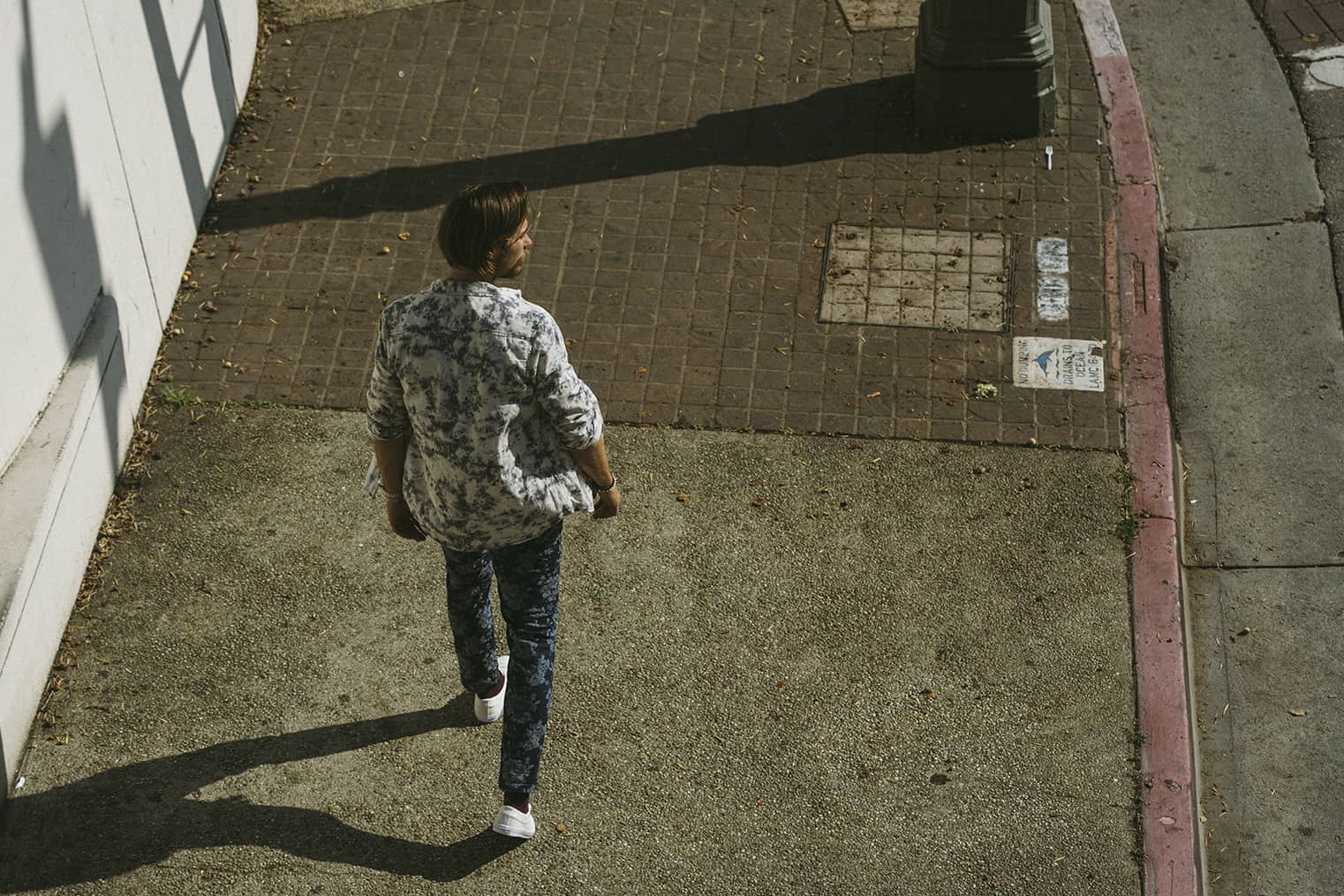
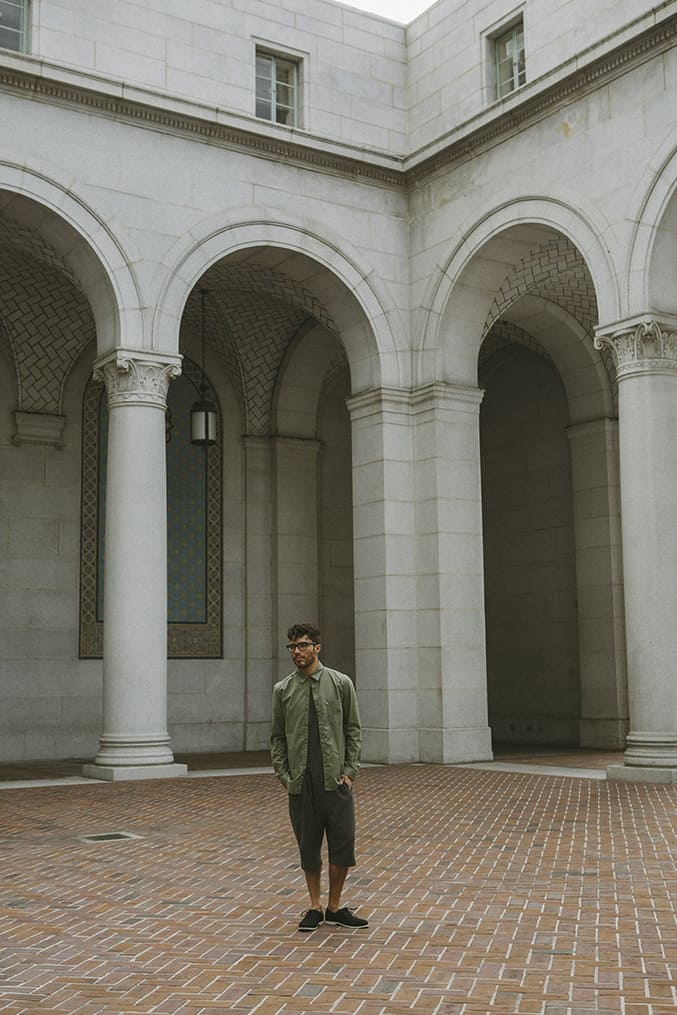

”Generic
Were you looking for mentors, at that point?
Kinda? But I think, just because I was so concerned about working, I think with anything that’s worthwhile, you have to stay the course a bit. You have to allow it to happen, and I would maybe enquire, but be off to the next thing before I got an answer.
It wasn’t your focus.
Right. I think I was more focused on learning as I went, because I think on the surface, it wasn’t so complex. You learn how to set the lights up, you learn how to interact with the clients, be punctual. But when it comes to learning a business, and all the complexities that come with that, that’s a whole different engine, so it wasn’t until later I realized, “Okay, I need help with this,” I need help, how to manage time, selling, marketing and invoicing, and billing.
So where did you go to learn that?
Really getting deep into YouTube!
Because it sounds like you did it in a very traditional timeline, you learn the craft, then you learned the vision, then the business.
For me, I had to find my voice, not only visually, but on a personal level, I didn’t really find it until I started to really delve within myself and realize it’s okay to just be myself, follow my instincts. I don’t have to be in a box.
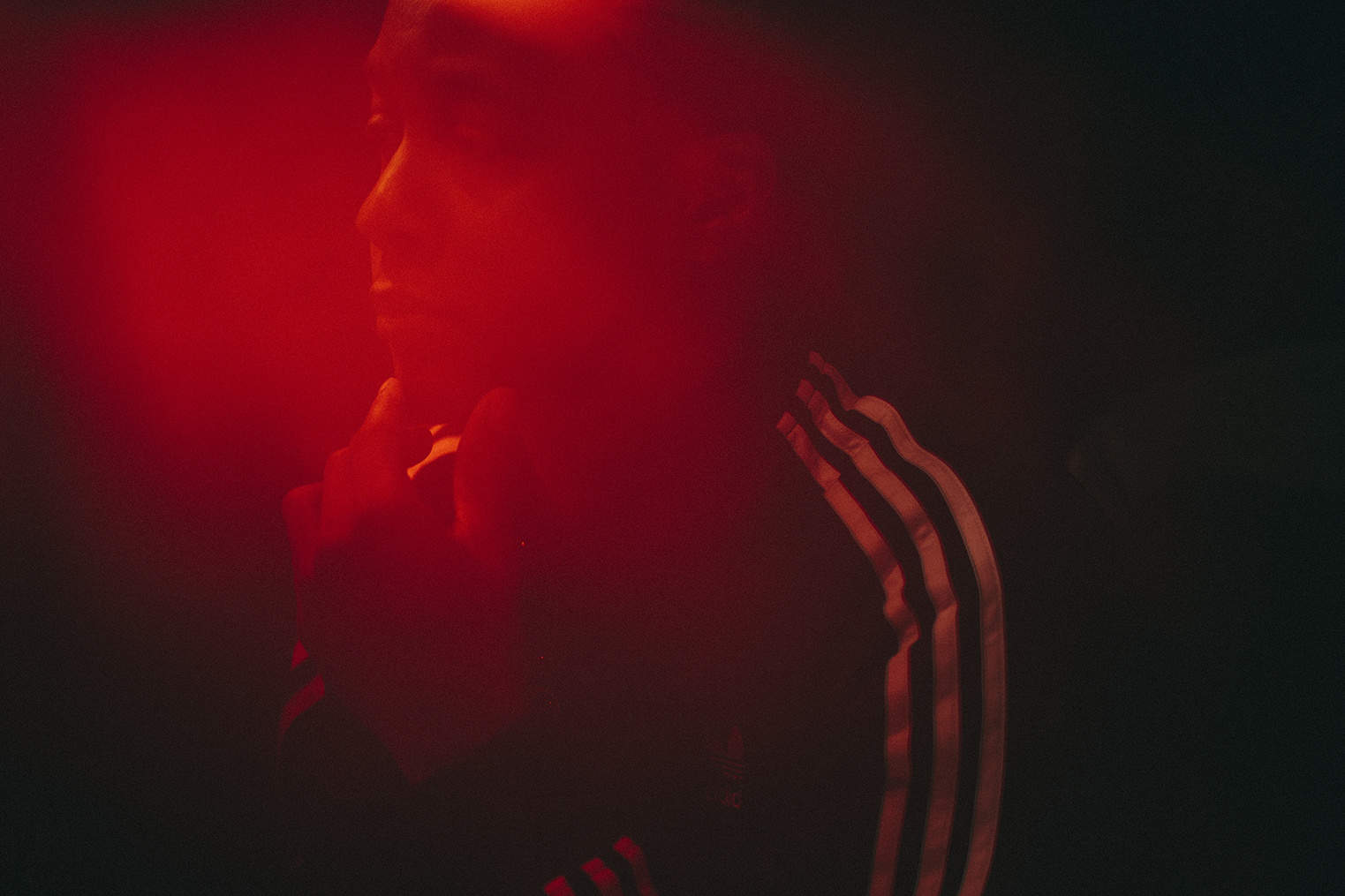
DJ Quick – Gari Askew